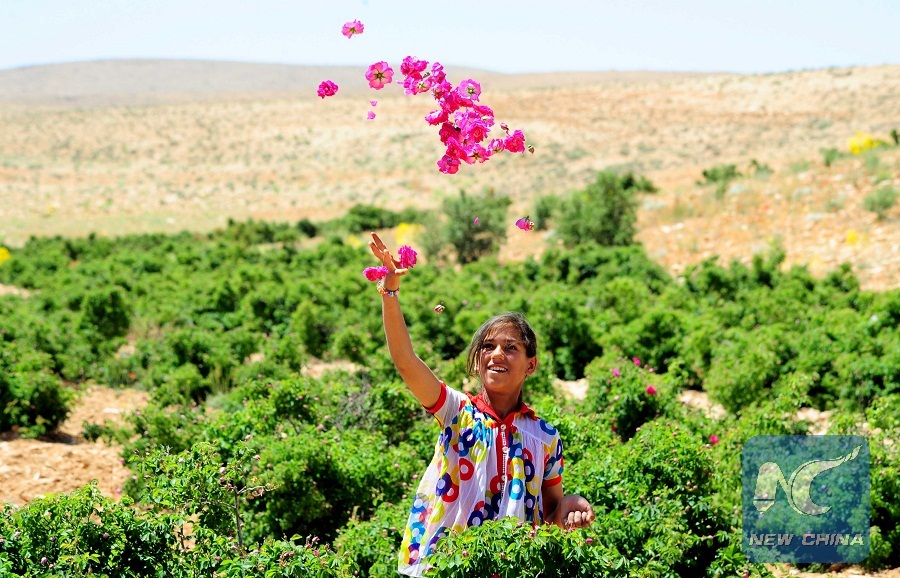
Syrian children take part in the picking process of the famous Damask, or Damascene Rose, in town of al-Marah, north of the capital Damascus, on May 29, 2017. (Xinhua/Ammar Safarjalani)
AL-MARAH, Syria, May 30 (Xinhua) -- The Damask Rose was affected by the darkness that has befallen Syria over the last six years, but the rose, also known as the Damascene Rose, has started healing again at the foothills of the Qalamoun region in Syria.
At a certain point in the first two years of the crisis, the pink double flower missed those who used to take care of it, as the fields of roses in al-Marah town north of Damascus became a sort of a military zones for the army to haunt down rebells in nearby towns and to prevent them from sneaking into the town.
But after the area was secured by the army over the past two years, the farmers returned to revive the rose, whose history goes back to the time when the Romans were said to had brought the rose to England from this region.
Considered an important type of Old Rose, Damask is a two-meter deciduous shrub, which is cultivated every year in January and February with the harvest in May and June. Its stems are armed with curved prickles and stiff bristles. The leaves are pinnate, with five leaflets.
The farmers say the rose, which is renowned for its special flagrance, and heady-scented oil, is recovering in its birthplace in Al-Marah, after suffering from the scars of the prolonged Syrian war.
Median Bitar, one of the farmers in charge of the cultivation and harvest of the rose, told Xinhua that ahead of the crisis, the Damascene Rose was cultivated in farmlands estimated at nearly 4,000 acres, but as a result of the crisis the farmland used for planting the rose shrank between 2,000 and 2,500 acres.
During the crisis, the process was neglected and the the new plants got dried and withered, but we have tried to pull ourselves together and this year we cultivated around 2,000 to 2,500 acres and we are expecting the outcome this year to be between 30 to 40 tons of the Damascene Rose in the village.
The Bitar family has for long been largely in charge of cultivating and harvesting the rose and extracting its water and oil in their makeshift factory in their home in the town and their company slogan is "Reviving the Damask Rose."
Walking among the village children, who were helping in collecting the rosebuds from the thorny branches, Bitar said he goes to the field everyday to oversee the picking process of the rose.
"We harvest the roses in the morning, taking them to the factory and we start making jam but the main substance is the rose water, from which we derive several items, the most important of which is the rose oil," he added.
He said that before the war, the plant was long enough people could shelter from the scorching sun under its shade, but now it's only less than one meter high.
Bitar stressed that the original strain of the rose is from al-Marah, adding that there is a global demand for this strain of rose, urging for new techniques to extract the oil of the rose more efficiently as he said 10 tons of roses needed to make one kilogram of oil.
He said the gram of oil is sold in the U.S. for 60 U.S. dollars, adding that foreign companies offered him 100 U.S. dollars last year, out of their demand for the original strain of the rose.
"We are exerting huge efforts to have this rose planted across Syria, and mainly in its original land such as in the al-Marah town, in order to secure the amount of oil needed for exportation as there is a demand from foreign countries to this rose. We don't face any problem marketing this rose or its products because of the global demand," he told Xinhua.
As for the marketing of the products of this rose, his brother, Amin, told Xinhua that the international fairs, which used to take place in Syria head of the crisis, made it easy for them to sell their products.
Such events, he said, were extremely important for them as they were venues for people to get to know the various products extracted from the rose.
Amin said that during the crisis the fairs largely stopped, and that affected the selling and marketing of the products, in addition to the fact that the production and harvest stopped for two years due to the military situation there.
But now, hope is on the horizon with the recovery of the rose and the few fairs that have started to be held in Syria.

